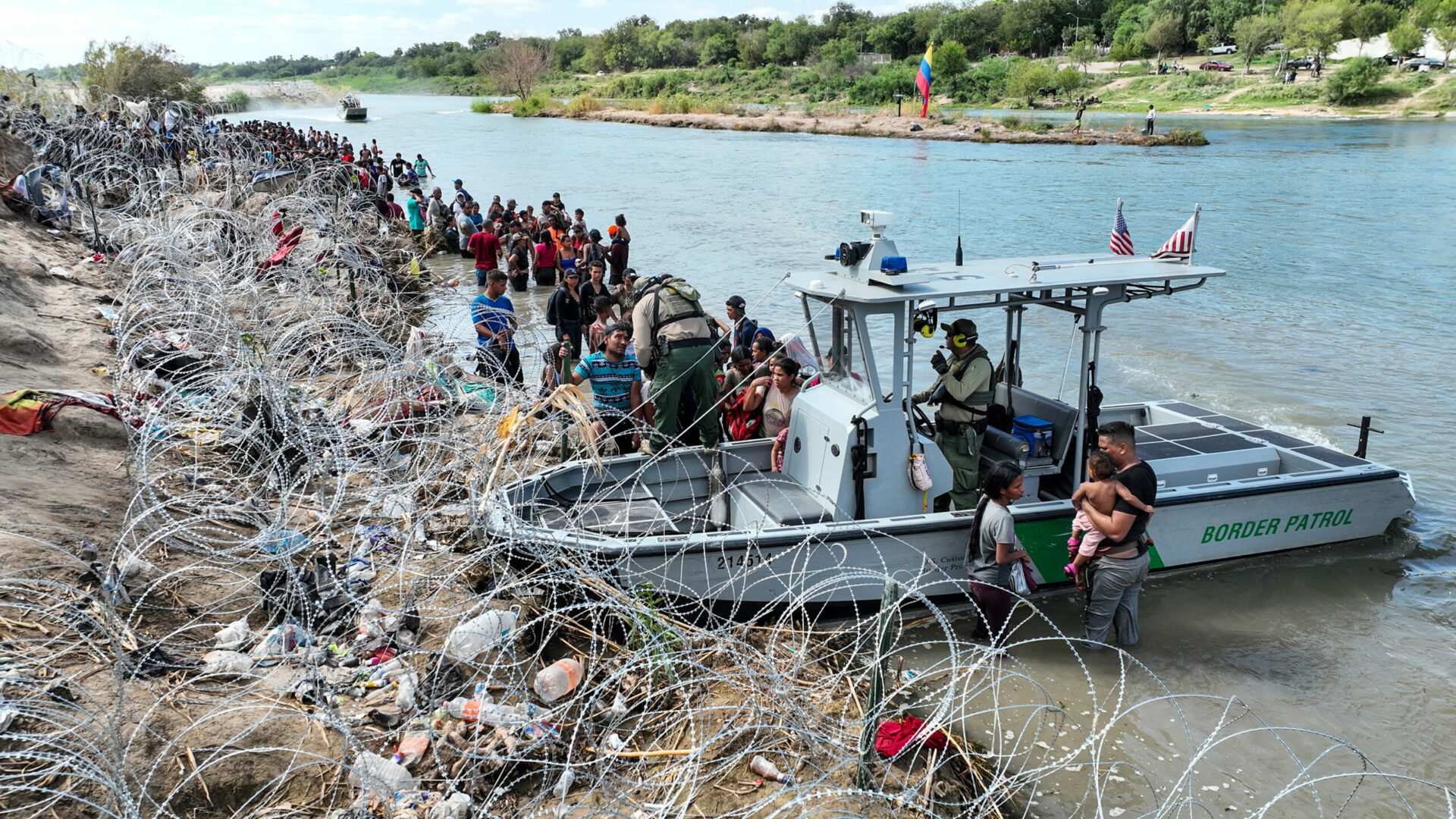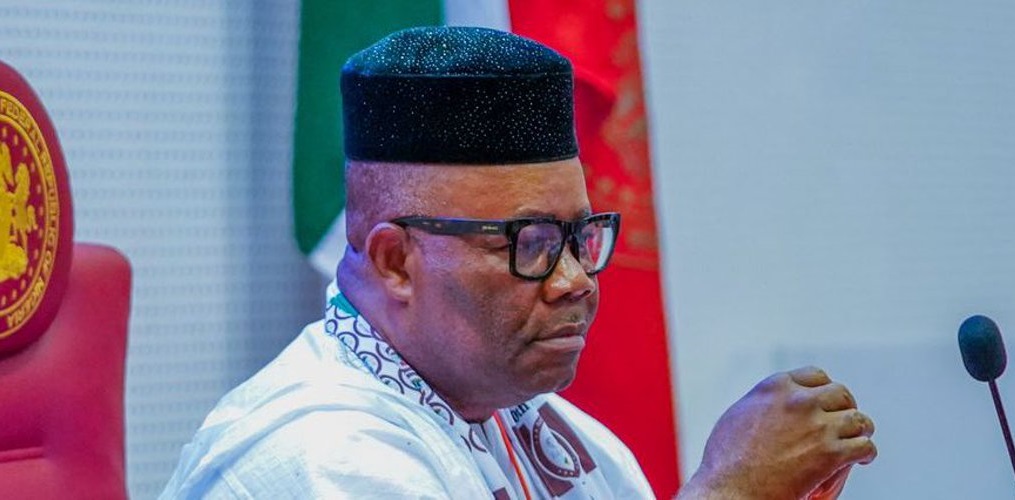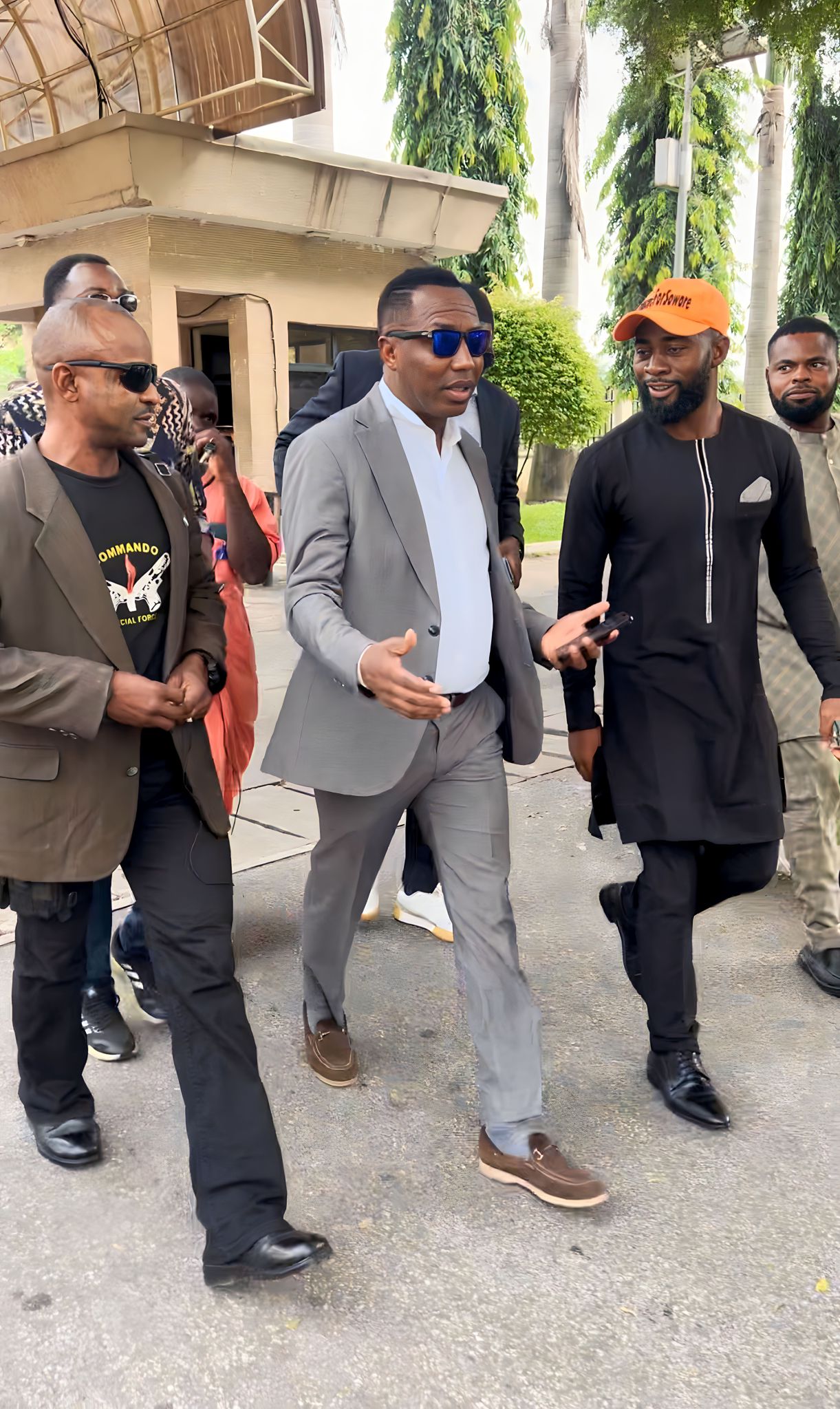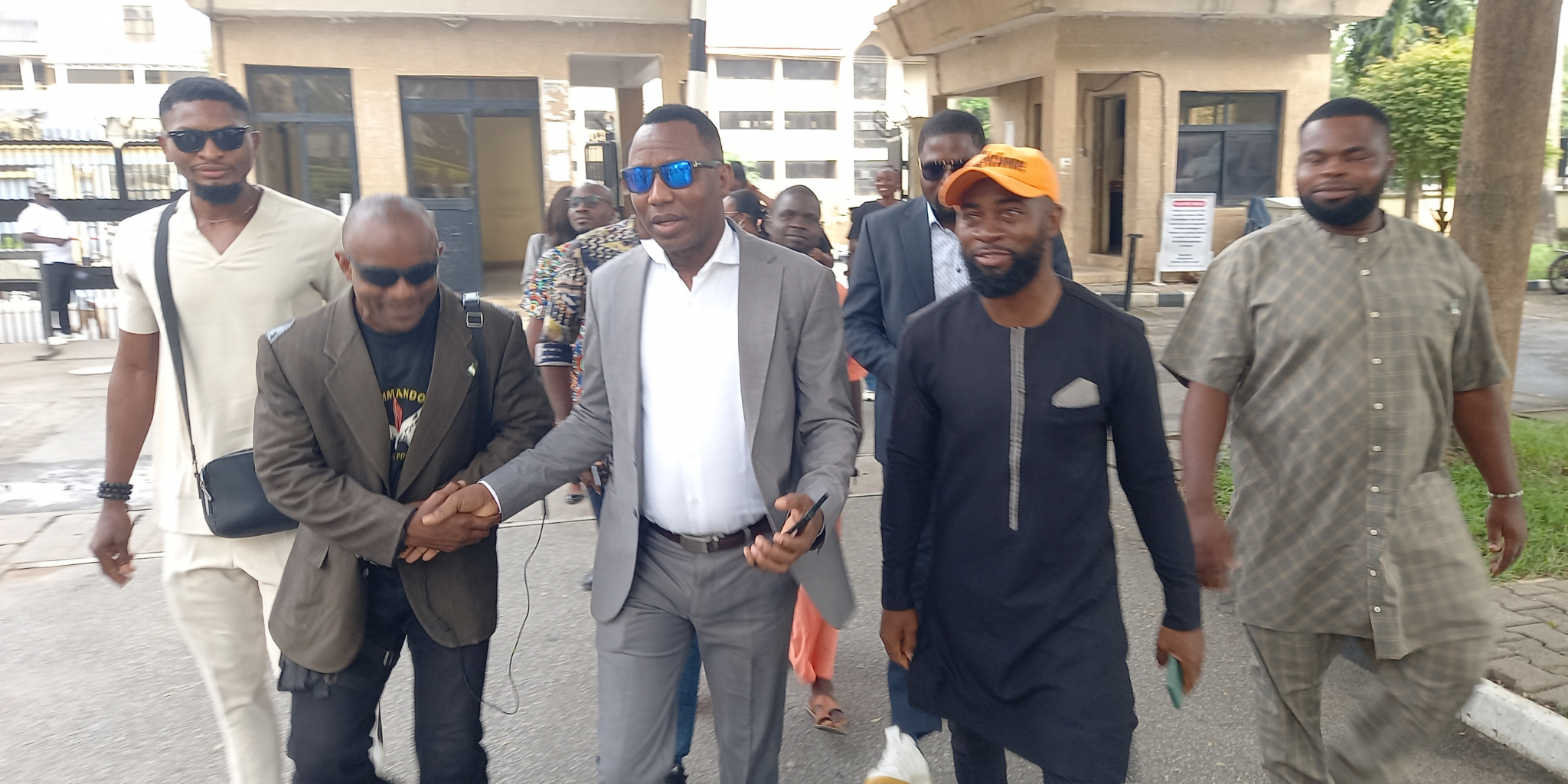Haiti’s surge in gang violence and kidnappings is forcing aid organisations to rethink shipment routes, staff risks, and security costs – and to consider the ethical and safety implications of trusting leaders of armed gangs who say they can help.
This phenomenon isn’t unique to Haiti, and is notably prevalent in Latin America. From Brazil to Colombia to Peru, humanitarian organisations are in a difficult bind: Negotiate with armed groups and gangs, or accept that staff may be put in more danger or that aid won’t reach some of the people who need it most.
In Haiti, rampant gang violence has meant delays in getting help to an estimated 4.9 million people in need of assistance, some of whom were impacted by the 7.2-magnitude earthquake on 14 August that killed more than 2,200 people in the country’s southern peninsula.
The International Committee of the Red Cross (ICRC) estimates that more than half of the Haitians who need humanitarian assistance – 2.5 million of the country’s 11.4 million people – live under the control of armed groups.
Esther Dupain used to be one of them.
In June, armed men shot and killed her mother and then burnt down her house during an eruption of violence in Martissant – a gang-riddled neighbourhood in the south of the capital, Port-au-Prince. Dupain sought shelter in Champs de Mars – a sprawling park near the ruins of the National Palace, destroyed in the catastrophic January 2010 earthquake that killed between 100,000 and 300,000 people.
Summer flooding soon transformed streets into rivers, and the park became a flashpoint for frequent gunfights between gangs. Dupain was forced to join 1,500 others living in a large gymnasium in Carrefour, in the city’s western outskirts. Roughly 19,000 people have been displaced by gang violence in the capital since June.
“There’s nothing left for me here,” Dupain, 32, told The New Humanitarian in November, adding that she hoped to migrate to the neighbouring Dominican Republic to be with her 15-year-old daughter. Together, Haiti and the Dominican Republic comprise Hispaniola, the second largest Caribbean island after Cuba.
Disasters, political upheavals, and stark economic realities have driven many Haitians to seek opportunities abroad over the past decade, but the worsening gang violence has seen a recent surge in outward migration.
Read more → Who’s to blame for Haiti’s migration crisis?
The number of gangs in the capital has skyrocketed since the assassination of President Jovenel Moïse in July, according to Eric Calpas, a sociologist who has studied youth and armed groups for decades. In some neighbourhoods, it’s unclear which gang is in control, or if an area will suddenly be engulfed in gunfire between rival gangs.
For aid groups trying to deliver vital assistance, the situation is hugely problematic. Gangs control the area around the main port where fuel shipments arrive. They are also present in the industrial business zone where food is often stored, as well as along roads heading out of the capital towards the disaster-battered southern peninsula.
Some aid groups had been using a different route south through Laboule, but the area has recently become a battleground for rival gangs: Two journalists were recently killed there.
“Alternative routes [to the southern peninsula] don’t exist,” Christian Cricboom, country director for the UN’s emergency aid coordination body, OCHA, told The New Humanitarian.
The unrest has forced some aid organisations and NGOs to curtail operations or stop them entirely. Médecins Sans Frontières, for example, shut down its hospital in Martissant in August due to the spiralling violence. The hospital, which is still closed, had been providing free treatment to more than 300,000 people. Midwives for Haiti, meanwhile, had to limit clinics for pregnant women due to roadblocks and fuel shortages linked to the gang violence, according to country director Jean-Mariot Cléophat.
“Violence has escalated – not only the level of violence, but the type of violence.”
While others are scaling back, some aid organisations have stepped up their efforts exactly because of the violence and rising needs. The ICRC shuttered its operations in Haiti as the situation improved roughly four years ago, only to re-open an office after the August earthquake. It has since been helping to improve access to healthcare services amid the uptick in violence and worsening fuel shortages.
“Violence has escalated – not only the level of violence, but the type of violence,” ICRC’s regional director, Sophie Orr, told The New Humanitarian.
Kidnappings have become regular risks, not just for aid workers but for everyone living in Haiti. A gang kidnapped a group of missionaries In October. Some were freed after a ransom was paid. The others said they managed to escape. Three aid workers were also kidnapped last year, but many aid officials who spoke to The New Humanitarian declined to give details on incidents involving their organisations for security reasons.
A week-long truce announced in mid-November by Jimmy “Barbecue” Cherizier, leader of the G9 federation of gangs, provided some respite to NGOs: Roadblocks were lifted along key roads connecting the capital and the international airport to the southern peninsula.
But many also fear Cherizier: A former police officer who had close links to Moïse, he was sanctioned by the US Treasury for his alleged role in a 2018 attack against anti-government protesters during which 71 people were killed and at least seven women raped.
Rising security costs
Because the security situation in the Caribbean country has been so unstable, the World Food Programme has been redirecting some aid from the main hubs in the capital through air transport or via barges to other sea ports. For instance, a helicopter and a small plane operated by the United Nations Humanitarian Air Service (UNHAS), and managed by WFP, delivers aid daily to Carrefour.
But there are no guarantees that gangs won’t stop even these deliveries. And not all relief organisations can afford to pay for shipping via barges or planes. Many also lack the funds to pay for security guards.
The UN occasionally employs armed escorts to cross gang-blocked roads, such as in Martissant. But getting commercial security companies to help train aid groups in hostile environments and driver safety in Haiti has been a challenge. Many firms have refused to work here, or charge exorbitant rates if they agree.
Christina Wille, director of Insecurity Insight, which provides security analysis and recommendations to humanitarian workers, said three main factors determine how groups address the security issue in Haiti: disposable funds, their degree of involvement with local organisations and communities, and whether their focus is more on their own organisation or helping partner groups.
“These are quite different security approaches,” Wille explained. “It depends on what you have to report to donors, or a board, or founders. It’s a very different mindset if you are a very well-resourced agency which operates in a big international structure”, and that doesn’t have to rely on “low-cost, home-made security solutions” for the protection of local staff, as smaller groups often have to.
“You can’t just ring the gang leader’s front door.”
With many organisations no longer having expat staff in the country – and even for many of those that do – there’s an increasing focus on supporting local staff through additional training. This can include everything from general kidnapping preparedness to teaching key tips such as varying routes to work, ensuring you’re not alone for money withdrawals, and regularly communicating your whereabouts.
Aid groups “need to have clear ethical policies on what they would and would never do”, Wille added, warning that many options carry risks. “You can’t just ring the gang leader’s front door,” she explained. “You have to build your contacts very carefully. But sometimes you have to go through some dodgy people.”
Wille gave the example of a group of NGOs that she consults with regularly that was recently able to arrange a convoy through a gang-run area thanks to the assistance of religious leaders who were in close contact with key people in the armed groups.
Isabel Marquéz, deputy director for the Americas at the UN’s refugee agency, UNHCR, added that using existing networks – such as local aid groups and community organisations – can help facilitate such openings.
“When you are setting up a humanitarian corridor, there is a certain level of communication, a certain level of dialogue,” she said. “But that by no means implies [formal] recognition of such groups.”
Delicate negotiations
The ICRC has had many years of dealing with similar situations elsewhere, namely in parts of Colombia and the VRAEM region of Peru – both settings where it engages with local groups and community leaders in areas where armed groups operate.
“Those who have been involved in fighting see you for what you do, if you do it well and with transparency for all those involved,” Orr told The New Humanitarian.
Building acceptance among local communities in Haiti has been key for NGOs such as Christian Blind Mission, a German NGO providing assistance to people with disabilities.
“We deal with all the hostile actors in a certain area and try to build a level of acceptance with each of them – be they corrupt officials, checkpoint staff, armed militias, or violent gangs,” Tom van Herwijnen, the group’s global security manager, told The New Humanitarian, adding that it uses intermediaries to establish contact with gang leaders.
In Haiti, this might mean dealing with someone like Gana Ti Zile, whose nickname means “small island” in Creole. He is a member of the G-Pep gang in the Brooklyn neighbourhood of Cité Soleil, a sprawling shantytown of some 400,000 people near the capital’s port where gang activity has been a fixture for decades.
Gana Ti Zile said he has acted as an intermediary to facilitate access for Concern Worldwide, an aid group that has long worked in Haiti.
“Once you have a connection inside Cité Soleil, and you meet with us, we consider you a friend,” he told The New Humanitarian in December. “Whoever wants to come and work inside Cité Soleil and wants to help, we are open to it.”
While Concern would not confirm having contact with gang members, Fiona Gannon, its regional director, said the group “works with a number of community facilitators who come from gang backgrounds in Haiti.
“This is fully consistent with our approach to engagement in conflict settings such as the urban context in Haiti where there is a high risk of violence and insecurity,” she added. “The engagement of community facilitators ensures the safe delivery of humanitarian services and conflict-resolution programmes that aim to break down barriers between communities and to promote dialogue.”
Another organisation working in Cité Soleil, AVSI, told The New Humanitarian that being known by local gangs for its community work had facilitated access. The Italian organisation provides psychosocial and nutritional support, and gender-based violence care for women and children.
Even after points of contact within the gangs have been established, changes in their leadership or approach can disrupt operations, causing loss of access and months of new trust-building discussions, explained Flavia Maurello, AVSI’s programme coordinator in Haiti.
Maurello recalled this happening in early 2021 in Village de Dieu, a shantytown in the capital, following the assassination of one of the country’s most powerful gang leaders. “Now, it’s figuring out who to talk to, and who is ruling which area,” she said.
In December, after weeks of escalating unrest, AVSI had to temporarily close its field office in Martissant, located in what Maurello called the “death zone” – a neighbourhood from which thousands had fled violence earlier in the year.
Mounting needs
The knock-on effects of the capital’s gang violence are keenly felt in Haiti’s southern peninsula, which bore the brunt of the August 2021 disaster and was hit by a second earthquake late last month that killed two people and destroyed hundreds more buildings.
The delivery of aid to the region has been patchy due to damaged roads and bridges, but also because of roadblocks erected by gangs.
Normally, a few months after a disaster like the August earthquake, the need for non-food items – mattresses, tents, hygiene kits – eases, but that hasn’t been the case this time, explained Justin Colvard, country director for the aid group Mercy Corps.
“There is still an urgent need for non-food items,” Colvard told The New Humanitarian in November. “Families are already living on a knife’s edge, and have very little margin for error. The delays presented by road blockages and fuel shortages have no doubt created delays in humanitarian assistance… it could mean a household doesn’t eat.”
In addition to the rising needs resulting from the ongoing insecurity and a deepening hunger crisis – more than one in three people here need urgent food assistance – an uptick in the deportation of Haitian migrants has piled yet more pressure on humanitarian organisations.
Read more → Can Haiti rebuild a food system broken by disaster, historical injustice, and neglect?
Since September, some 16,500 Haitian migrants have been returned from the United States, while the Dominican Republic has also been cracking down, expelling some 31,000 Haitians in 2021. Many deportees have been gone for years, and return to find even more dire circumstances in a homeland now wracked by gang violence.
Katiana Louis discovered this in November when, nine months pregnant, she went to her husband’s workplace in the Dominican Republic to deliver his lunch, only to be loaded onto a packed truck with him. Louis and her mason husband, Geslin Berno, were deported with 45 others across the border. The UN’s migration agency, IOM, said more than 150 pregnant women were deported from the Dominican Republic during the first two weeks of November.
The physical trauma is thought to have caused Louis to lose her baby girl two days after her return, at a hospital in Pignon, about 100 kilometres from the Dominican border.
“The delays presented by road blockages and fuel shortages have no doubt created delays in humanitarian assistance… it could mean a household doesn’t eat.”
Midwives for Haiti had stopped providing maternal care at a government clinic in Madan Jwa near the border in September after a local gang terrorised staff and patients.
“The fuel shortages and roadblocks are making it harder for us to accomplish anything – and mothers and babies are dying,” said Cléophat, the group’s country director.
In January, a maternity unit in Léogâne, 30 kilometres west of the Haitian capital, had to close after a gang stole a newly purchased generator before demanding an extortion payment to have it returned.
Weakened government
Lucinda Cassagnol Laguerre, general coordinator of MOFAVIDA, a local organisation that partners with UN Population Fund (UNFPA) to provide healthcare, has to transit through Martissant every day to reach the sports centre in Carrefour where Dupain lives with the other 1,500 displaced people.
Laguerre blames the gangs, but also the government for the mess the country is in. “The violence they are creating here is the state’s doing,” she said.
Gangs have long been used by political leaders to exert control in Haiti, but the country’s current leader – Prime Minister Ariel Henry – seems unable to quell the violence. He narrowly escaped an assassination attempt himself in January.
In many areas, police are outnumbered by gang members, who have kidnapped or killed police officers, sometimes looting police stations for weapons.
“We try to do the maximum with the little we have, but it must be understood that security is a shared responsibility,” Garry Desrosiers, the spokesperson for the National Police of Haiti, told The New Humanitarian.
A UN peacekeeping mission, MINUSTAH, used to provide troops to help security in Haiti, but it came to a close in 2017 after a string of controversies, including sexual abuse scandals and a cholera outbreak that killed 10,000 people after the 2010 earthquake.
The dangerous situation for aid agencies and the people they serve in Haiti is not expected to improve any time soon.
Henry’s refusal to step down as acting president on 7 February, the day Moïse’s term was due to end, prolongs the political uncertainty and raises the prospect of renewed violence. No date has been set for new general elections – again, largely due to the gang violence and insecurity.
Jessica Obert reported from Port-au-Prince, Haiti. Paula Dupraz-Dobias reported from Geneva, Switzerland. Edited by Paisley Dodds in London, UK.

_1696962008.jpeg)







